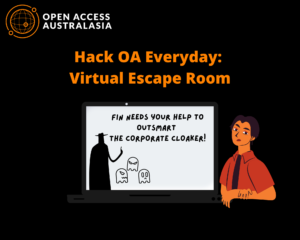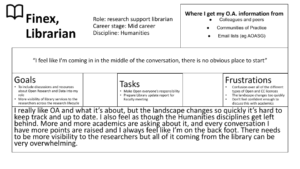 As a part of the OA Week 2021 sessions and with a view to having a diverse program, the planning committee decided to have a hack-style session. I was pleasantly surprised when Ginny asked me to start brainstorming what this session could look like. After researching online Zoom activities for adults (that they weren’t already sick of) I had a hunch that a virtual escape room could work. Although most of the articles about virtual escape rooms were written by teachers for school students, there was something about the adaptability of the escape room that drew me in.
As a part of the OA Week 2021 sessions and with a view to having a diverse program, the planning committee decided to have a hack-style session. I was pleasantly surprised when Ginny asked me to start brainstorming what this session could look like. After researching online Zoom activities for adults (that they weren’t already sick of) I had a hunch that a virtual escape room could work. Although most of the articles about virtual escape rooms were written by teachers for school students, there was something about the adaptability of the escape room that drew me in.
Alongside the planning of OA Week 2021, I have been creating content for the Open Access Australasia website and Twitter. In my list of potential ideas sat a campaign called ‘OA Everyday’. This campaign addressed the concerns shared by many OA practitioners who feel as though they are not keeping up in the open access space. This pain point had been highlighted numerous times through work done by the OA Practitioner group in 2020 (see Journey Mapping images below). I was able to identify with this feeling. For me, I never felt like I could truly speak to open access because I had not published, let alone published open access. Academic publishing is a key focus for open access, but open access principles are important for many other types of information. Realising this was my open access light-bulb moment. There are countless ways in professional and personal life where open access is relevant and important. You can read, engage and promote open access resources that are relevant to your job and your interests outside of work. This campaign idea was special to me as my open access light-bulb moment was what drew me to work with Ginny and Open Access Australasia.

Journey Mapping profiles, created by the AOASG OA Practitioner Group 2020.
A focus of my project work has been to create resources that OA practitioners can find via the Open Access Australasia website while also having resources that can be adapted by practitioners. I decided to apply this focus to the escape room. After completing the session participants were empowered to take the escape room, adapt it if they wanted and run the activity for their colleagues and researchers.
I showcased important open resources such as The Biodiversity Heritage Library, FrogID, Wikipedia and the fully open access journal, PLOS Medicine. These resources are great examples of the open access, the FAIR principles and are diverse in subject material, thus inviting participants to find something within the resource that sparks an interest. I chose to meld the concept of the virtual escape room, the OA Everyday campaign and the adaptability of open resources together to create this session.
The virtual escape room ran initially during OA Week with a fabulous group of Australian and New Zealand participants and a second session was run for Open Publishing Fest with New Zealand colleagues. Participants enjoyed the activity for its quirky and fast paced nature, with one participant stating, “it was really fun and a welcome change from webinars and PowerPoint presentations”.
If you missed out on participating in the escape room sign up to the Open Access Australasia newsletter and be sure to follow Twitter @openaccess_anz for updates of future sessions.
For further information on our Virtual Escape Room contact info@oaaustralasia.org